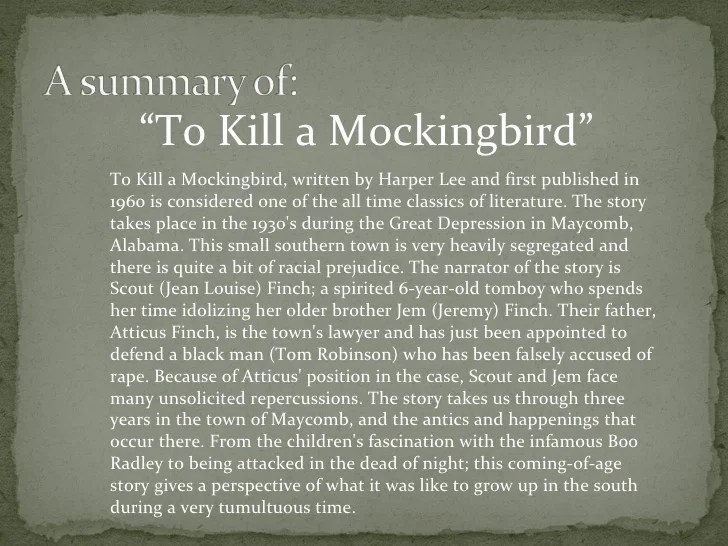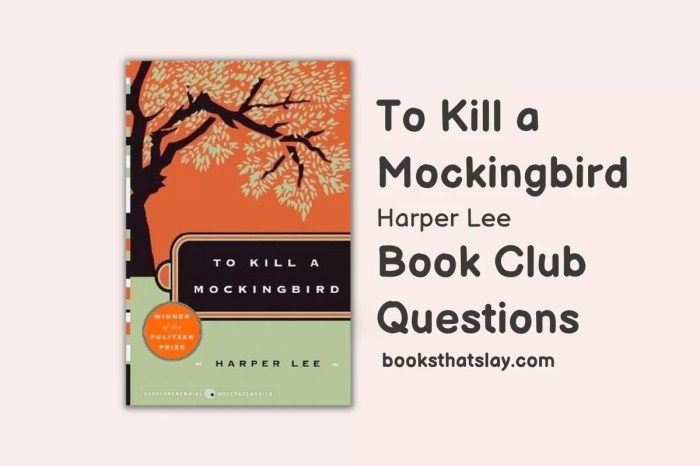To kill a mockingbird book discussion questions – Harper Lee’s classic novel “To Kill a Mockingbird” has captivated readers for generations, prompting profound discussions about justice, race, and morality. Our curated list of discussion questions delves into the novel’s intricate characters, compelling themes, and enduring significance.
From analyzing the motivations of Atticus Finch to exploring the complexities of Boo Radley, these questions encourage a deeper understanding of the novel’s timeless message.
Character Analysis: To Kill A Mockingbird Book Discussion Questions

To Kill a Mockingbirdfeatures a cast of complex and memorable characters. Atticus Finch, Scout Finch, and Boo Radley are three of the most iconic figures in American literature.
Atticus Finch, To kill a mockingbird book discussion questions
Atticus Finch is a lawyer and the father of Scout and Jem. He is a moral and ethical man who believes in justice and equality for all. He is a strong role model for his children and for the community of Maycomb.
Scout Finch
Scout Finch is the narrator of the novel. She is a tomboy who is curious and intelligent. She is also a strong and independent girl who is not afraid to stand up for what she believes in.
Boo Radley
Boo Radley is a mysterious neighbor who is feared by the children of Maycomb. He is a recluse who rarely leaves his house. However, Scout and Jem come to learn that Boo is a kind and gentle man who is misunderstood by the community.
Themes

To Kill a Mockingbirdexplores a number of important themes, including racial prejudice, justice, and innocence.
Racial Prejudice
Racial prejudice is a major theme in the novel. The novel is set in the Jim Crow era, a time of legalized segregation in the United States. The novel shows the devastating effects of racism on both black and white people.
Justice
Justice is another important theme in the novel. The novel shows that justice is not always easy to achieve, but it is always worth fighting for. Atticus Finch is a strong advocate for justice, and he teaches his children the importance of standing up for what is right.
Innocence
Innocence is a third important theme in the novel. The novel shows that innocence is often lost in a world of prejudice and hatred. However, the novel also shows that innocence can be regained, even in the darkest of times.
Questions Often Asked
How does the novel’s setting in the Jim Crow era shape its themes and characters?
The novel’s setting in the Jim Crow era of the American South is integral to its exploration of racial prejudice and injustice. It highlights the pervasive racism and segregation that existed during that time, shaping the experiences and perspectives of the characters.
In what ways does Scout Finch serve as a symbol of innocence and hope?
Scout Finch, as the novel’s narrator, embodies the innocence and optimism of childhood. Through her observations and experiences, she challenges the prevailing prejudices and injustices, representing the possibility of a more just and equitable society.
How does the novel explore the conflict between individual conscience and societal norms?
The novel presents several instances where characters must choose between following their conscience or conforming to societal norms. Atticus Finch’s decision to defend Tom Robinson exemplifies this conflict, highlighting the moral dilemmas faced by individuals in the face of injustice.

